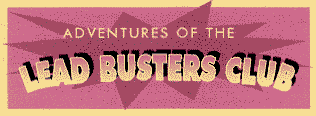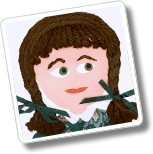A Note to Parents or Guardians
You can use these buttons to move to the next or previous webpage.
A Note to Parents or Guardians
A Note to Parents or GuardiansA Note to Parents or Guardians

From: _____________________________
Date: ______________________________
In school, your child has been learning about lead poisoning. Lead poisoning is a serious but preventable health problem. Lead can cause permanent damage to young children. It can harm the brain and other parts of the nervous system and can cause long-term behavior and learning problems.
Millions of houses and apartments built before 1978 have paint that contains lead. Dust and flakes from this paint are the major sources of lead poisoning in children.
Symptoms of Lead Poisoning in Elementary School Children
Children with lead poisoning may not look or act sick. Even if children do show some signs of lead poisoning, these symptoms can often be mistaken for other illnesses, such as the flu.
Early symptoms may include:
- Tiredness or restlessness
- Headache
- Stomachache
- Constipation
- Irritability
- Poor appetite
As more lead accumulates, children may:
- Become clumsy and weak
- Lose skills that they have already learned
More severe symptoms may include:
- Vomiting
- Loss of sight or hearing
- Becoming unconscious
In school, children with lead poisoning may:
- Disrupt their classes
- Perform poorly
- Be unable to tolerate frustration
- Have problems learning
- Be easily distracted
- Have difficulty concentrating
Children who are not lead poisoned may show some of these symptoms from time to time, although usually to a much milder degree. Moreover, many of the symptoms of lead poisoning may also indicate other health conditions or learning and behavior problems. However, if you suspect lead poisoning, you should have your child tested by a doctor or other medical professional. A simple blood test can tell you if your child has been lead poisoned.
Protecting Children from Lead Poisoning
Here are the important messages your children have been taught about lead poisoning:
- Children should never touch paint flakes or paint dust.
- If children see paint flakes or paint dust, they should ask a grownup to wash away this material with a damp, soapy rag. The grownup should then throw away the rag. (Because vacuuming and dusting with a dry rag can spread lead dust, they are not recommended.)
- Children should wash their hands before they eat and after they play. Washing their hands will help to remove lead dust.
- Children should leave their shoes at the door and wear socks or slippers in the house. This helps to keep lead from the soil out of the house.
- Children should eat healthy foods, like lowfat milk and yogurt, fruits and vegetables, beans, and lean meat. These foods may help to protect their bodies from the harmful effects of lead.
For further information, contact your local health care provider or your local health department.
Back to "The Lead Busters Club"
You can use these buttons to move to the next or previous webpage.


